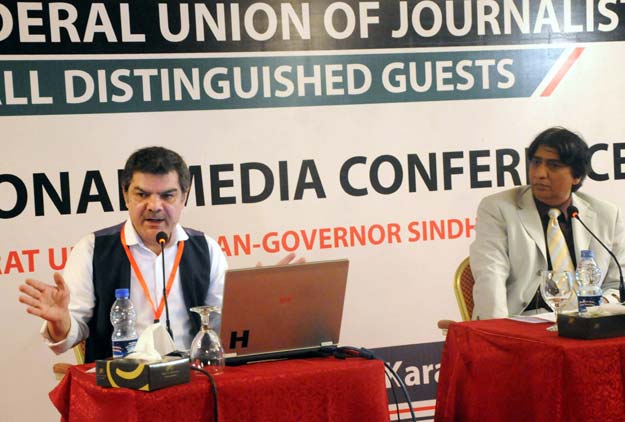
"The problems faced by journalists today are the same as they were 68 years ago and they will remain, until and unless confronted wilfully," said TV anchor Mubashir Luqman. He was speaking at a session, titled Freedom of Expression, on the first day of the International Media Conference.
The two-day conference, organised by the Pakistan Federal Union of Journalists (PFUJ), started on Saturday at the Pearl Continental Hotel and aims to question the media's credibility and practices in today’s global politics.
"The notion that media is the fourth pillar of the state is nostalgic," Lucman asserted. "If it were, it would have a stake in making the policies."
He delivered a list of hindrances that journalists face while working in different parts of the country. "In Karachi, one cannot objectively report without being confronted with bullets or abuses," he said. Speaking about the Punjab, he said there was a severe sectarian issue in the province. "Whenever I did a story on the Shia killings in Quetta, I received subtle threats from Malik Ishaq, the leader of a banned militant organisation." With regard to the violence-prone parts of Khyber Pakhtunkhwa, Fata and Balochistan, Luqman lamented that most of these areas were no-go zones. "You cannot report about the militants or the military."
A number of working journalists, including Mazhar Abbas, Salman Ghani and Maria Memon attended, hosted and moderated the hours-long sessions discussing various issues. The programme was also attended by representatives of the International Federation of Journalists (IFJ).
IFJ president Jim Boumelha, in his presentation, sought protection for journalists. "In two-thirds of the cases, the killers were identified," he said, adding that murder was considered an easy tool to eliminate journalists and silence their voice. Jim was of the opinion that journalists enjoyed same rights as civilians but they needed more protection because they worked in conflict zones.
Speaking on the occasion, PFUJ president Rana Muhammad Azeem gave some numbers of journalists' casualties. "135 journalists have been killed, over 100 tortured after being kidnapped, while 1,372 were injured on duty." He, however, did not give the timeline of the data.
Published in The Express Tribune, May 3rd, 2015.

1722586547-0/Untitled-design-(73)1722586547-0-165x106.webp)


1732326457-0/prime-(1)1732326457-0-165x106.webp)












COMMENTS
Comments are moderated and generally will be posted if they are on-topic and not abusive.
For more information, please see our Comments FAQ